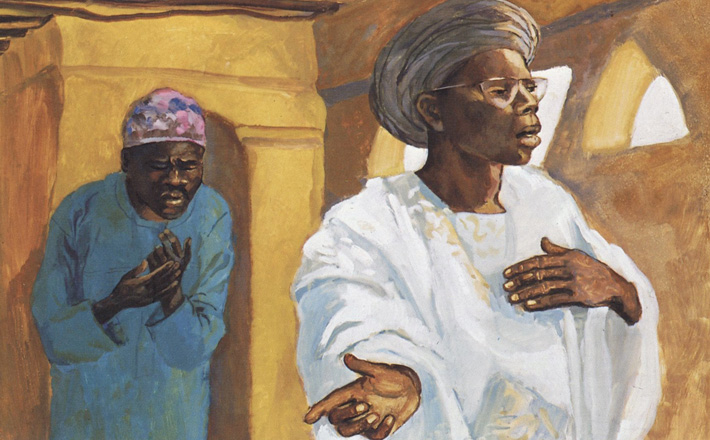Commentary on Jeremiah 14:7-10, 19-22
Jeremiah 14 drives us into the darkness.
There is no easy gospel in this chapter.
The people make a confession of sins that seems thorough: “our iniquities testify against us” (7), “our apostasies…are many” (7), and “we have sinned against you” (7).
The response, however, is not the expected announcement of forgiveness. The relationship between God and people is not restored. Instead, the gap is extended with the expression “this people.” The demonstrative pronoun “this” is stark. The distance is further extended with an indictment: they have loved to wander, without restraint.
But, we might ask, isn’t that just what they have confessed by admitting that their apostasies are many?
In this particular section of Jeremiah, the verdict is unshakeable. The Lord does not accept them. The relationship is no longer expressed with possessive pronouns (my people/your God; our God/your people). “This” is a long way from “my” or “your” or “our.” The distance inherent in “this people” implies the end of the covenant relationship. Now, in this prophetic exchange, the immediate future is set by God’s commit to remember their iniquity. To remember iniquity means punishment. The severance of the covenant relationship does not mean out of sight, out of mind. It is not a matter of divine indifference; rather, the mind of God is focused on “this people.” The focus, however, is for harm, not for good. When covenantal blessing ceases, it is not a matter of a neutral absence of good. The cessation of covenantal blessing is the beginning of disaster, not merely the relenting of good.
The second half of the reading, starting with verse 19, recognizes the extent of the switch: rejection, loathing, striking down, no good, and terror are the shape of life when God’s people become “this” people. Nevertheless, the (“this“) people resume confession: “we acknowledge our wickedness.” The confession does not just concern the historic wickedness of the community (“the iniquity of our ancestors”), but also the contemporary enactment of our own iniquity (“we have sinned against you”).
The chapter doesn’t simply chide the people for insincerity in their confession. It is not a case where the confessional words are right but the heart isn’t in it. It is not merely an attack of dead ritual, a common complaint against conventional religion. There isn’t any call for turning up the amps on sincerity. Singing “The Old Rugged Cross” with greater fervor will not do. Whether the level of sincerity was high or low in the past, sincerity is not the issue now. The issue in the now of the text is rejection.
Here is where the preacher needs to tend to verses 1-6 and 11-18. The context is one in which there is ample evidence of judgment; life is coming to an end. The destruction of the community is at hand; in fact, the destruction has started. This is not the discipline of a call to repentance. This is a “grievous wound,” a “crushing blow” — this is not chastisement. Death is pervasive in the countryside and in the city. The embodiment of rejection is already being experienced.
We might try to soften the force of rejection language by appealing to a generalized principle such as “what you sow is what you reap.” Social injustice produces social turmoil and collapse. The principle is easily supported by a quick look at the newspaper. Yet this text asserts more. God has rejected the people of God. The false prophets had insisted that God would not reject. Instead, God, in their view, would only bless, even to the point of exempting them from the natural consequences of social injustice. They claimed that the community would not experience sword and famine (13, 15). But the famine was already in place (1-6)!
The famine was both the natural consequence of social disorder and the active work of God. God was active in the collapse: “By sword, by famine, and by pestilence I consume them.” When the people state at the end of their petition in verse 22 that the Lord has done all this, they are not exaggerating. Neither are they shifting the blame to God and off themselves. In their lament they do not claim to be innocent sufferers. The severity of the punishment is at issue because it means the end of the relationship, not because the punishment exceeds the crime.
Once God is active in punishment, the only way out comes from God. That is what is being pleaded here, and the plea is rejected by God. God is, in this text, rejecting the intercession of the people — not because it is insincere, but because the time for pleas is over. Judgment (rejection) has commenced. Even the prophet is prohibited from taking up their plea. Moses did so after the golden calf and spy episodes in the Pentateuch (Exodus 32-34 and Numbers 13-14). In the opening words of Jeremiah 15, not even Moses or Samuel, much less Jeremiah, could successfully intercede.
Our quest for reasonableness in religion comes to an abrupt end in a chapter such as this. The impact of the text cannot be reduced to the natural consequences of social (or personal) transgression. Such consequences are present, but the text claims more. God is involved. And in this instance, God’s involvement is God’s judgment.
God is not just present in the good strands of disasters. God is not absent from the harm itself. It is common to assert that God is with us in disasters — whether natural or human-caused — and that God does not abandon us. Acts of kindness in the midst of disasters are conventionally pointed to as signs of God’s presence. It’s as if God gets the silver linings in the dark clouds. We desperately want to be spared the thought that God is active in the dark cloud, not just against the dark cloud.
But God’s presence is not merely the good subsections or components in a larger system. That might feel safer for a moment, but it concedes too much. That would leave too much of the experience of the world to be devoid of God’s active presence and agency.
By itself, there is no easy good news in this chapter. This chapter remembers iniquity — period! We should avoid the temptation to jump ahead to Jeremiah 31:34 too quickly: “I will forgive their iniquity and remember their sin no more.” The move to forgiveness goes through the heart of God, and we know from the New Testament that it is not a facile move. It involves a crucifixion. False prophets seek to avoid the agony of Jeremiah 14 and in the process both mislead the people and trivialize the crucifixion.


October 27, 2013